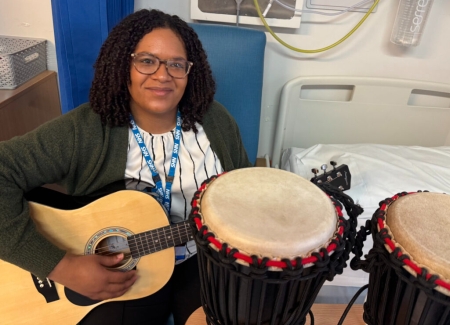
Stroke patients at Doncaster and Bassetlaw Teaching Hospitals (DBTH) are set to benefit from an innovative two-year pilot programme introducing Music Therapy to the Stroke Rehabilitation Service at Montagu Hospital.
Funded by the Doncaster and Bassetlaw Teaching Hospitals Charity, the service will be led by newly appointed Neurologic Music Therapist, Abbie Jean-Baptiste, whose work is set to inspire hope and progress among patients.
Stroke remains one of the leading causes of disability in the UK, with one in four individuals expected to experience a stroke in their lifetime.
Music Therapy is an established psychological and clinical intervention designed to help individuals affected by illness, injury, or disability. It meets psychological, emotional, cognitive, physical, and social needs through music-based activities tailored to each patient’s goals.
As a recognised Allied Health Profession (AHP), Music Therapy engages the brain’s plasticity—its ability to adapt and form new neural connections—to aid recovery.
Techniques used by Music Therapy include singing for aphasia, a condition that affects a person’s ability to communicate, often caused by a stroke or brain injury.
Singing supports speech and language recovery by leveraging the brain’s ability to process music differently from spoken language, using methods like Melodic Intonation Therapy (MIT), which pairs exaggerated rhythm and melody with phrases to stimulate language production. This approach helps patients improve word retrieval and fluency.
Other techniques include breathing exercises to improve vocal clarity, instrument playing to address motor skills and inattention, music for walking, and group therapy for processing life changes after experiencing a stroke.
Abbie joined the Trust in November, bringing her passion and expertise in Music Therapy to the pilot programme. She said about her new role: “I am so excited to have this fantastic opportunity! Music has so many healing elements, and I’m grateful for the chance to advocate for its benefits. When you attend Music Therapy sessions, you can expect a non-judgmental, safe space to explore your thoughts and feelings.
“The biggest myth around music therapy is that you need to sing or play an instrument—don’t worry, you don’t need any special talent. My role is to help you regain speech, strengthen muscles, and walk with more ease.
“Functional goals are at the heart of each session, whether we’re singing to improve speech, playing instruments to build motor skills, or simply using music as a tool to enhance your recovery.
“I want to help you achieve your goals and use music to drive those changes. Yes, it’s enjoyable because we integrate rehab with music, but it’s also incredibly effective.”